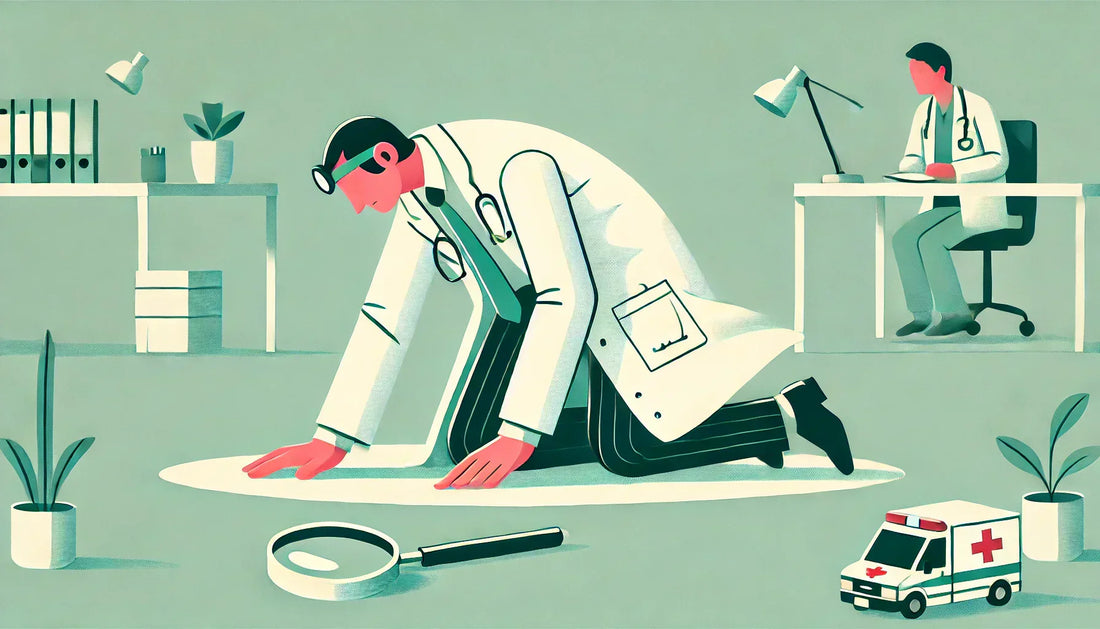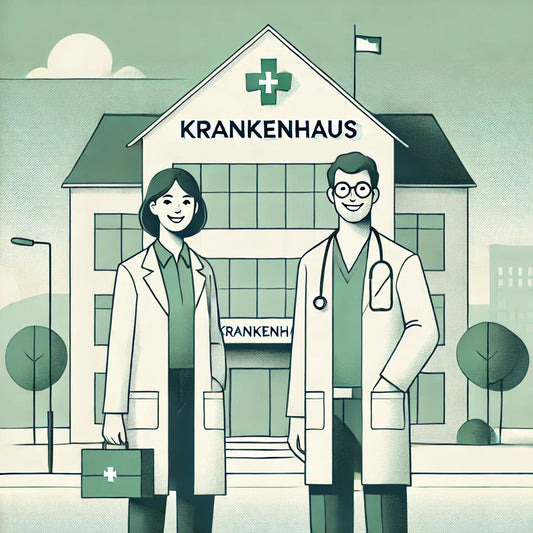Medical residency in Germany opens multiple pathways for graduates. Facharzt(specialist) training allows doctors to work in a public or private hospital, or set up a private practice or work in research and academia. With the doctor salary in Germany offered while working in a hospital, a person gets a sense of job security and career progression. On the other hand, private practice offers autonomy and potentially better financial rewards. Another option for international graduates in Germany is research positions that contribute to innovation in medicine. Every pathway comes with its own challenges and rewards, so understanding what you want to get out of it will help you pick the career that’s right for you. Let’s take a closer look at these opportunities.
1. Job Prospects in Hospitals in Germany
Germany offers residency for non-EU citizens who go on to work in hospitals as specialists, offering stability, advancement, and financial security. Healthcare provides diverse opportunities in clinical care, research, and administration. Within these fields, specialists can continue to pursue subspecialties or progress to leadership roles like Oberarzt (Senior Physician) or Chefarzt (Chief Physician). Hospitals offer well-defined career paths, opportunities for international cooperation, and access to cutting-edge medical technology, making them an attractive career option for many doctors in Germany. Read here about getting started with a medical career in Germany.
Types of Hospitals in Germany
- Public Hospitals (Uniklinik & Städtische Krankenhäuser) – Affiliated with universities and provide research opportunities.
- Private Hospitals – Often offer higher salaries and focus on specialised services.
- Church-Run Hospitals (Diakonie/Caritas) – Operated by religious organizations but function similarly to public hospitals.
Doctor Salary in Germany
The salary of a doctor in Germany can vary widely based on the medical establishment, amount of tax deducted and the role and stage of the medical career. The range of pre-tax or "gross" salary of a doctor in Germany is as follows:
- Newly appointed specialists (Facharzt) earn €6,000–€8,000 per month (gross).
- Senior Physician (Oberarzt) roles start at €8,000–€12,000 per month.
- Chief Physician (Chefarzt) can earn €15,000+ per month, with bonuses and incentives.
Career Growth in Hospitals
- Oberarzt (Senior Physician) – Takes on leadership roles within a department.
- Chefarzt (Chief Physician) – Heads an entire department, negotiates salary contracts, and has significant decision-making power.
- Medical Director – Highest administrative position within a hospital.
Work-Life Balance & Contracts
- Work hours vary based on speciality and hospital type.
- Private hospitals may have more demanding schedules but higher pay.
- Contracts can be permanent or temporary, with probation periods lasting around 6 months.
 2. Job Prospects in Private Practice in Germany
2. Job Prospects in Private Practice in Germany
If you prefer independence, you can one day start your own private practice (Niederlassung), assuming that you receive the necessary licenses (Approbation or medical license, KV registration if treating insured patients). So, they share costs by working in group practices (Gemeinschaftspraxis). A private practice is taking off the shackles of employment and playing in a space where you can pretty much do as you please and create your own fairytale wealth, but with that come the added costs of marketing the business, handling the little shop if you will, and working with some strict regulations based on our last name healthcare. Independent practitioners, particularly those in high-demand specialities, can earn considerably more than hospital-employed physicians.
Group Practice (Gemeinschaftspraxis)
- A shared clinic with multiple specialists divides expenses and patient care responsibilities.
- Helps in reducing the financial burden and increasing patient reach.
Opening Your Private Practice
- To treat publicly insured patients, you must register with the Association of Statutory Health Insurance Physicians (Kassenärztliche Vereinigung).
- Private practice doctors can also opt to treat private patients only, which may be more profitable.
Investment & Earnings
- Initial setup costs: €50,000–€200,000 (depending on location and speciality; there are multiple programs offered by the government in support of a doctor opting for this route).
- Earnings vary widely but can reach €25,000+ per month for successful practitioners.
- High-income specialities include radiology, dermatology, and cardiology.
Benefits & Challenges
✅ Autonomy – Full control over patient care and work schedules.
✅ Higher Earning Potential – More revenue opportunities with private insurance patients.
✅ Flexibility – Ability to set your own hours and patient load.
⚠️ Financial Risk – Requires an upfront investment in equipment and location.
⚠️ Administrative Responsibilities – Managing a practice involves handling finances, staff, and legal requirements.
⚠️ Regulatory Compliance – Must adhere to strict healthcare laws and maintain ongoing professional development.
 3. Research & Academia for Doctors in Germany
3. Research & Academia for Doctors in Germany
Another option for students who have completed their medical residency in Germany is to work in university hospitals, engaging in clinical work and research, conducting clinical trials, studying novel treatments, and publishing in academic journals. Research physicians generally earn a PhD (Dr. med.) through post-doctoral studies working with leading institutions. Medical innovation is supported through funding from institutions such as the German Research Foundation (DFG) and EU grants. A clinical trial investigator or medical advisor position in biotech and pharmaceutical companies is also available. This pathway provides intellectual stimulation, career growth, and contributions to evidence-based medicine, making it an attractive option for those passionate about medical progress.
PhD & Postdoctoral Research
- Doctors interested in research can pursue a PhD (Dr. med.) or postdoctoral positions in various fields.
- Many university hospitals and institutes offer funding for research projects.
Grants & Funding Opportunities
- DFG (German Research Foundation) provides research funding.
- EU grants and hospital research funds are also available for innovative medical projects.
Industry Research & Pharma Careers
Doctors can transition into medical research roles in pharmaceutical companies, plasma and blood donation centres, biotech firms, and medical device companies. Roles include:
- Clinical Trial Investigator
- Medical Advisor in Pharma Companies
- Regulatory Affairs Specialist
Teaching Roles in Academia
- Many Facharzt-certified doctors take up positions as lecturers or professors.
- Teaching at a medical university can provide a stable career with research opportunities.
Job Prospects for Doctors in Germany
Doctors in Germany can opt for different career avenues after completing their residency. Many who want stability and a career will stay in the hospital as specialists or pursue leadership roles. For doctors who go into private practice, there’s a lot of flexibility in the schedule, and they can earn more. On the other hand, those interested in research and academia can pursue clinical trials and medical innovations or academic positions. Each option presents unique challenges and rewards, making it essential to plan early based on your personal and professional aspirations for a successful and fulfilling medical career in Germany.
Accelerator Program
Step-by-step guidance program to a medical residency in Germany.
Recognition/ Defizitbescheid
- We help you get your foreign medical qualifications recognized by German authorities and save you up to 6 months and 1000s of euros.
Visa Application
- Applying for the correct visa (e.g., § 16d Abs. 1 AufenthG for recognition of foreign qualifications) can be challenging. We guide you to ensure your visa application is accepted, allowing you to focus on your residency preparations.
German Language
- Mastering medical German language is essential for practising as a foreign doctor in Germany. Prepare with professional teachers with RBT for medical language exams and attend Hospitations to gain practical language experience.
Residency Application
- Once your qualifications are recognised and your language requirements are met, we will help you navigate through the application process, from approbation to residency, help you prepare for interviews.
Designed for high-performing individuals, our goal is to streamline your journey to securing a medical residency in Germany, allowing you to focus on what matters most—your career development.
"Here we support the next generation of foreign medical doctors start a medical residency in Germany. Discover our customised programs designed to accelerate your path to a German medical residency program. Start your journey today!"




